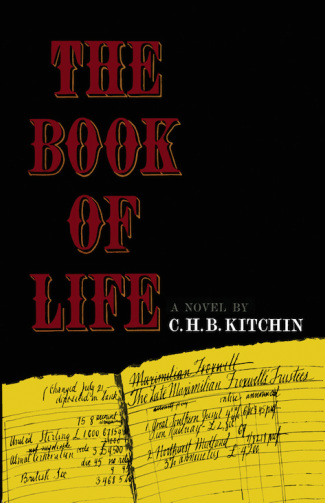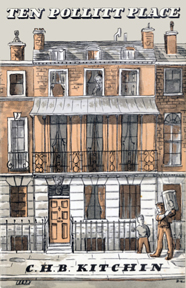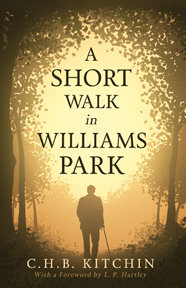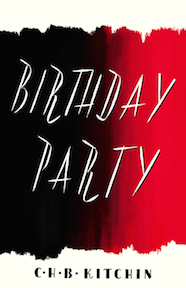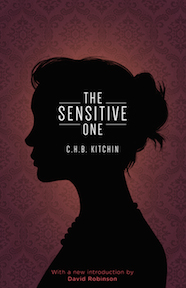|
BOOK DETAILS
Trade paper ISBN-13: 978-1939140821 List Price: $17.99 U.S. Pages: 220 Published: 2009 |
The Book of Life (1960)
C.H.B. Kitchin With a new foreword by Francis King Book Description
Set in the twilight of the Edwardian era, this is the story of Francis Froxwell, a young orphan fascinated by his grandfather's 'Book of Life', a ledger that lists the immense wealth he and his relatives will inherit when the old man dies. Unhappy at boarding school and treated coldly by his relations, Francis finds solace in the thought of his future fortune and a possible baronetcy. Francis's only friends are his uncle Demetrius, whose affair with a divorcée has made him the black sheep of the family, and Jimmy Waring, a disgraced ex-schoolmaster and the brother of Demetrius's mistress. As Francis finds himself unwittingly caught up in the intrigues of these two men, a chain of events is set in motion leading to sex, scandal, blackmail, and death . . . and the elimination of at least one name from the 'Book of Life'. An unjustly neglected novelist, C.H.B. Kitchin (1895-1967) was best known for his early mystery novels and was frustrated later in life when he continued to turn out minor masterpieces like Ten Pollitt Place (1957) and The Book of Life (1960), which won critical acclaim but were largely overlooked by the book-buying public. This edition features an introduction by Francis King. |
reviews
'One must admire the perfectly done thing, and this evocation of the late Edwardian age, told with ironic grace and subtlety, is the best thing of its kind since L. P. Hartley's The Go-Between.' - Vogue
'Worldly, wise, mild, funny, and tender, written in constantly felicitous prose.' - Manchester Guardian
'[A]n exciting story as well as an evocation of feeling, time, and place which completely fascinates. The author plays the reader with an expertise to which one can only surrender with the utmost pleasure.' - The Scotsman
'Mr Kitchin is an enjoyably ruthless writer.' - Punch
'Mr Kitchin is still writing the traditional, well-bred, upper-English-middle-class novel. He does it finely, with a loving art.' - The Spectator
'As a satire on the abuse of money and as a portrait of a vanished age, this perfectly poised comedy is beyond praise.' - The Observer
'The writing is unobtrusive, the characters are genuine, and yet every turn of the plot is devised to point the irony of the title.' - The London Times
'Worldly, wise, mild, funny, and tender, written in constantly felicitous prose.' - Manchester Guardian
'[A]n exciting story as well as an evocation of feeling, time, and place which completely fascinates. The author plays the reader with an expertise to which one can only surrender with the utmost pleasure.' - The Scotsman
'Mr Kitchin is an enjoyably ruthless writer.' - Punch
'Mr Kitchin is still writing the traditional, well-bred, upper-English-middle-class novel. He does it finely, with a loving art.' - The Spectator
'As a satire on the abuse of money and as a portrait of a vanished age, this perfectly poised comedy is beyond praise.' - The Observer
'The writing is unobtrusive, the characters are genuine, and yet every turn of the plot is devised to point the irony of the title.' - The London Times
ALSO AVAILABLE THROUGH ONLINE RETAILERS
MORE TITLES BY THIS AUTHOR
AUTHOR BIOGRAPHY
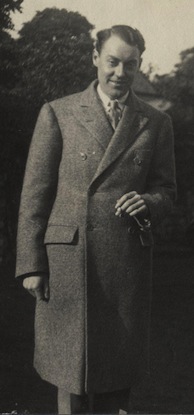
C.H.B. (Clifford Henry Benn) Kitchin was born in Yorkshire in 1895. He attended Exeter College, Oxford, and published his first book, a collection of poems, in 1919. His first novel, Streamers Waving, appeared in 1925, and he scored his first success with the mystery novel Death of My Aunt (1929), which has been frequently reprinted and translated into a number of foreign languages.
Kitchin was a man of many interests and talents, being called to the bar in 1924 and later amassing a small fortune in the stock market. He was also, at various times, a farmer and a schoolmaster, and his many talents included playing the piano, chess, and bridge. He was also an avid collector of antiques and objets d'art.
Kitchin was a lifelong friend of L. P. Hartley, with whose works Kitchin’s were often compared, and was also a friend and mentor to Francis King, who later acted as Kitchin’s literary executor. In his introduction to the Valancourt edition of Kitchin’s The Book of Life, King recalls meeting Kitchin after the two wrote fan letters to one another in 1958 that crossed in the mail: King had written in praise of Ten Pollitt Place, while Kitchin’s letter had expressed admiration for the younger novelist’s The Man on the Rock (1957). King wrote, ‘[B]y the time that I met him, his fate was that of many elderly, once famous writers in England. Instead of lead reviews, he now got two or three paragraphs at the bottom of a page. Increasingly critics would apply the dread word “veteran” to him, much to his annoyance.’ This frustration is echoed in his novel Ten Pollitt Place, where Kitchin portrays himself in the character of the aging novelist Justin Bray.
Kitchin, who was gay, lived with his partner Clive Preen, an accountant, from 1930 until Preen’s death in 1944. C.H.B. Kitchin died in 1967.
Kitchin was a man of many interests and talents, being called to the bar in 1924 and later amassing a small fortune in the stock market. He was also, at various times, a farmer and a schoolmaster, and his many talents included playing the piano, chess, and bridge. He was also an avid collector of antiques and objets d'art.
Kitchin was a lifelong friend of L. P. Hartley, with whose works Kitchin’s were often compared, and was also a friend and mentor to Francis King, who later acted as Kitchin’s literary executor. In his introduction to the Valancourt edition of Kitchin’s The Book of Life, King recalls meeting Kitchin after the two wrote fan letters to one another in 1958 that crossed in the mail: King had written in praise of Ten Pollitt Place, while Kitchin’s letter had expressed admiration for the younger novelist’s The Man on the Rock (1957). King wrote, ‘[B]y the time that I met him, his fate was that of many elderly, once famous writers in England. Instead of lead reviews, he now got two or three paragraphs at the bottom of a page. Increasingly critics would apply the dread word “veteran” to him, much to his annoyance.’ This frustration is echoed in his novel Ten Pollitt Place, where Kitchin portrays himself in the character of the aging novelist Justin Bray.
Kitchin, who was gay, lived with his partner Clive Preen, an accountant, from 1930 until Preen’s death in 1944. C.H.B. Kitchin died in 1967.

